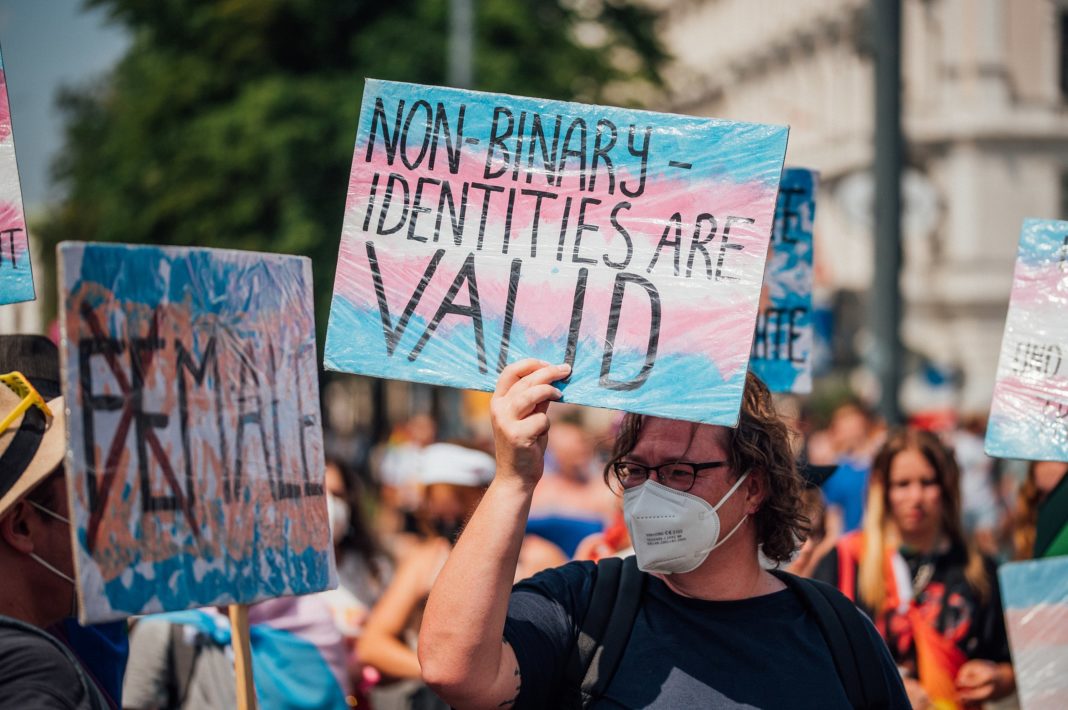
A trans non-binary person is bringing legal proceedings against the British government, urging it to legally recognise their gender as non-binary. Ryan Castellucci, a US citizen who moved to the UK for work in 2019, is legally recognised as non-binary in their home state of California, including on their passport and birth certificate.
In April 2022, Castellucci applied through the overseas route of the UK’s Gender Recognition Act (GRA) for legal recognition of their gender in the UK. But instead of confirming their legal gender as non-binary, the Gender Recognition Panel (GRP) issued Castellucci with a legal gender of uncertain meaning. Full press release can be viewed here.
Ryan Castellucci was given a Gender Recognition Certificate (GRC) that lists their gender as “not specified”, which has an unclear legal effect. In November 2022, law firm Leigh Day, representing Castellucci, wrote to the GRC requesting it either issue them a GRC listing their gender as non-binary or confirm that “not specified” has a legal meaning of non-binary.
When the GRP did not reply, Castellucci asked the High Court for permission to apply for a judicial review against the GRP and the secretary of state for justice, Alex Chalk KC. An initial directions hearing was held on March 31.
Now that the High Court has given permission for their judicial review to be heard, Castellucci will argue that the GRP has breached its statutory duty by issuing them with a GRC that is inaccurate and of uncertain legal effect; ask the court to declare that a legal gender of “not specified” means “non-binary” for all official and legal intents and purposes; and appeal the GRC’s decision to refuse to issue them with a GRC recording their gender as non-binary.
Ryan Castellucci told Trans Writes that being legally recognised as non-binary is important to them for a number of reasons, including “comfort and respect”, and that not knowing their legal gender in the country they plan to live in for the rest of their life is “existentially upsetting”.
“It’s rather upsetting to me to be forced to categorise myself as something I’m not when I’m interacting with the outside world,” they say. “It is amazing how many ridiculous paperwork issues I run into. Getting a gender recognition certificate is really, for me, only going to affect [my] death certificate and taxes.”
The UK currently only legally recognises two genders, men and women. This is despite a majority of respondents (64.7%) to the 2018 government consultation on reforming the GRA saying that changes should be made to British gender-recognition laws to accommodate non-binary people.
At least 30,000 people over the age of 16 identified as non-binary in the 2021 census, and a further 118,000 people identified as trans but didn’t clarify if they were a trans man or trans woman.
But multiple attempts urging the government to legally recognise non-binary genders, including from MPs on the cross-party Women and Equalities Select Committee and two petitions to the government that garnered signatures from more than 150,000 people, have been unsuccessful. The typical response from the Tories includes the line that it would be “too complex” to legally recognise non-binary people.
This was also the response of the UK’s Supreme Court in the separate but related case of Christie Elan-Cane, a non-gendered person who fought for the right to have an X gender marker on per passport. Elan-Cane lost per case in December 2021, with the Supreme Court ruling that there is no requirement for the government to issue passports with an X gender marker.
In Elan-Cane’s case, the Supreme Court also heard from government lawyers arguing that the administrative cost of introducing X gender markers to UK passports – around £2 million – is prohibitive.
Ryan Castellucci points out that this is not that much money “in the scheme of a government’s budget”. They describe the government as displaying “banally evil indifference” to the situation that it puts non-binary people like themselves in, whereby filling out forms and applying for official documents often requires choosing the “least worst option”.
“It would require effort to give you that respect and you’re not worth it, that is what the government keeps saying to non-binary people,” Castellucci says.
Fifteen countries around the world currently legally recognise non-binary people, including Argentina, Canada, Chile, Iceland, India, Germany, Malta, and New Zealand.
Ryan Castellucci adds that they are bringing the case because “the situation that I have been put in is an unending series of bureaucratic nightmares, which I would like to at least reduce”.
“I saw an opportunity to do something,” they say. “Trans and non-binary people in this country feel helpless. I wanted people to see that fighting back is possible.”
Kate Egerton, a solicitor at Leigh Day, said: “Our client is simply asking for legal recognition of their acquired gender, as the Gender Recognition Act explicitly requires the GRP to provide.
“It is both unfair and illogical for someone who is legally recognised in one country as non-binary to be forced to choose to be recognised as either male or female in the UK, or to be given a third ‘not specified’ option which has no legal meaning.”
An Equality Hub spokesperson said: “The gender recognition process in UK law only allows a change of sex from male to female or vice versa.
“We listened to those who responded to the GRA consultation and have taken steps to modernise the way that individuals can apply for a Gender Recognition Certificate as a result, including reducing the cost and moving the process online.”
Ryan Castellucci and their team are fundraising to offset the costs of the case.
This article was funded by LGBT+ Futures: Equity Fund is a two-year £786,000 partnership between Consortium and The National Lottery Community Fund, designed to help community-led and grassroot organisations supporting some of the most under-represented and marginalised LGBT+ communities. Read more here.














